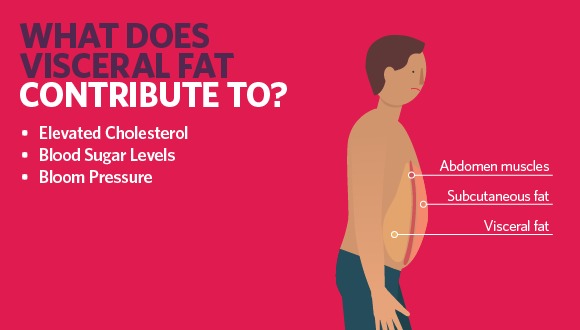Visceral fat: health problems beneath the surface
Updated July 2024 | 5 min read
Expert contributors Dr Michelle Groves, GP; Jennifer Smallridge, exercise physiologist
Words by Health Agenda team
While hard to see from the outside, hidden or visceral fat can cause health problems. Here are the signs.
Did you know that a slim frame can hide serious health problems? It can happen if you carry fat around your heart and abdominal organs (like your kidneys and intestines).
Called visceral fat, it impacts the functioning of our hormones and can contribute to elevated cholesterol, blood sugar levels and blood pressure. This could lead to a higher risk of type 2 diabetes, cancer and heart disease.
This is known as normal weight obesity or ‘skinny fat’.
In people with normal weight obesity “the weight according to their body mass index (BMI) is within normal range: people look thin, but their fat percentage is high and they have a low muscle mass,” explains Dr Michelle Groves, a GP specialising in diabetes and heart disease.
Risk factors include:
- ageing
- genetics
- having an inactive lifestyle
- not eating enough protein.

How to check your visceral fat levels
Waist measurement can be a helpful check for visceral fat. For men, this should be below 94cm, and for women, below 80cm. The Heart Foundation has more information on healthy waist measurement.
If you’re over these measurements, or lead an inactive lifestyle, regular check-ups with your GP are important. Your doctor may do checks including blood pressure, cholesterol and blood sugar to get a general indication of your health.
BMI is a common self-assessment. It’s calculated by your weight in kilograms divided by your height in metres squared, with a BMI of 18.5 to 24.9 considered within the healthy weight range. But BMI and weight alone can’t tell you if you have visceral fat, nor are they an accurate measure of overall health. The World Health Organisation says that your BMI should only be used as a rough guide, as everyone has different fat percentages.
There are other ways to check your fat levels, from bone density scans to high-tech scales, but they vary in reliability and cost.

How do you reduce visceral fat?
Even if your weight or BMI is in the normal range, you should still follow a healthy diet and exercise regularly.
“Just because someone is within a healthy weight range, they don’t have the liberty to eat extremely unhealthily,” says exercise physiologist Jennifer Smallridge. “You can’t necessarily ‘feel’ high cholesterol or high blood pressure, but it does all add up and can start to significantly impact health.”
Regardless of your weight, keep an eye on your cholesterol intake, as high cholesterol levels can increase your risk of heart disease. We can have high cholesterol due to our genes, or poor diet.
Saturated and trans fats in the diet tend to increase ‘bad’ cholesterol in the blood. Common sources of saturated fats include:
- animal products like butter
- meat fat
- beef
- lamb
- chicken skin
- full-fat dairy foods.
Trans fats are also found in some processed foods like pastries and biscuits and deep-fried foods.
“A healthy diet needs to include lean protein, fibre, fruit and vegetables, while limiting sugar, fat, alcohol and salt,” says Dr Groves. “Through all the fad diets that come and go, the Mediterranean-style diet has proven to be the most beneficial to our overall health and is recommended by many health professionals for diabetics, obese and heart disease patients.”
The Mediterranean diet includes:
- fresh vegetables
- fruits
- nuts
- seeds
- legumes
- whole grains
- olive oil
- fish.
It limits:
- sugar
- red meat
- processed foods like sausages or white bread.
Regular exercise is also important. The Australian government recommends you do both moderate to vigorous exercise (like brisk walking or jogging) and strength training each week.
“The value of exercise also appears to be in preventing the onset of visceral fat in the first place; and interestingly, those in the study who did no exercise for six months significantly increased their visceral fat levels,” Smallridge says.
Exercise doesn’t only help you reduce visceral fat, it prevents it from coming back.
Lose weight and keep it off
Losing weight and keeping it off over a long period of time can be challenging. That’s why we’ve partnered with Digital Wellness to give eligible HCF members* access to the evidence-based CSIRO Total Wellbeing Diet. Join over 500,000 Aussies who have lost weight, kept it off and improved their health and wellbeing.
Related articles
Ultra-processed foods: the risks?
Ultra-processed foods are everywhere these days. But what exactly are they? We explore the health risks and offer simple, heathier food swaps.
Resistance training for all ages
Resistance training is a key part of staying healthy for women at all stages – but older Aussies aren’t hitting their quota. Here’s how to integrate it into your daily life.
Healthy-heart workout tips
It’s the consistency of your workout routine that helps keeps your heart healthy, not how many kilometres you can run, says a leading cardiologist.
Healthy weight for life
For people with osteoarthritis, losing weight can turn around your health and boost your mood. Here's how the Healthy Weight For Life program can make that happen.
Important information
* See hcf.com.au/csiro-total-wellbeing-diet for eligibility.
This communication contains information which is copyright to The Hospitals Contribution Fund of Australia Limited (HCF). It should not be copied, disclosed or distributed without the authority of HCF. Except as required by law, HCF does not represent, warrant and/or guarantee that this communication is free from errors, virus, interception or interference. All reasonable efforts have been taken to ensure the accuracy of material contained on this website. It’s not intended that this website be comprehensive or render advice. HCF members should rely on authoritative advice they seek from qualified practitioners in the health and medical fields as the information provided on this website is general information only and may not be suitable to individual circumstances or health needs. Please check with your health professional before making any dietary, medical or other health decisions as a result of reading this website.